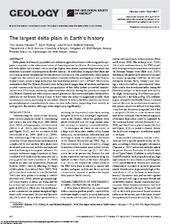The largest delta plain in Earth's history
Peer reviewed, Journal article
Published version

Åpne
Permanent lenke
https://hdl.handle.net/1956/22168Utgivelsesdato
2019-03-22Metadata
Vis full innførselSamlinger
- Department of Earth Science [1096]
Originalversjon
https://doi.org/10.1130/g45507.1Sammendrag
Delta plains host heavily populated and extensive agricultural areas with strong anthropogenic overprints on the natural evolution of these important landforms. Furthermore, modern delta plains have formed over a short geological time frame, representing immature end members to ancient counterparts in Earth’s history—it could thus be argued that these are poor analogues for deciphering the sedimentary rock record. Our present study offers unique insight into the controls and potential extent of ancient deltas by investigation of the Triassic Boreal Ocean, where a large delta plain has been traced across >1.65 × 106 km2. We show by comparison that the Triassic Boreal Ocean delta plain is larger than all modern and known ancient counterparts. Supply-driven progradation of this delta system proceeded uninterrupted on a 106 yr scale, indicating relative sea-level stability during this period—in support of a Triassic Greenhouse without pronounced glaciations. Reconstructed paleo-bathymetric relief shows the Triassic Boreal Ocean to have been one order of magnitude smaller than modern equivalents, explaining its vast extent. Despite its extent, the delta plain shows similar geomorphological characteristics to many modern delta plains, supporting their validity as analogues to the ancient, although scales might vary significantly.
